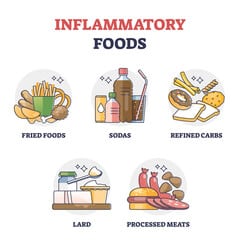In the modern world, convenience is king, and processed foods have become a staple in many people’s diets. They’re readily available, have a long shelf life, and often taste good. However, the convenience of processed foods comes at a cost. A diet high in processed foods can have significant negative impacts on your well-being. In this article, we’ll explore the dangers of a high-processed diet and why it’s essential to be mindful of your food choices for your health and longevity.
Understanding Processed Foods
Processed foods are defined as any food that has undergone a series of mechanical, chemical, or thermal processes to change its natural state. These processes are designed to extend the shelf life, improve taste, and make food more convenient to consume. Common examples of processed foods include sugary snacks, fast food, canned soups, frozen dinners, and many packaged convenience items found in the center aisles of grocery stores.
It’s important to note that not all processed foods are inherently bad for you. Minimal processing, like washing, cutting, and packaging fruits and vegetables, can be a healthy way to enjoy convenient, ready-to-eat produce. The real concern lies with highly processed foods that are laden with unhealthy ingredients and devoid of essential nutrients.
The Dangers of a High-Processed Diet
Nutrient Deficiency: Highly processed foods are often stripped of essential nutrients during processing. Many processed foods are low in vitamins, minerals, and fiber, which are crucial for overall health. Consuming a diet that lacks these nutrients can lead to deficiencies, weak immunity, and increased risk of chronic diseases.
Excess Sugar and Unhealthy Fats: Processed foods are notorious for containing excessive amounts of sugar and unhealthy fats. These ingredients are added to improve flavor and shelf life but contribute to weight gain, cardiovascular disease, and diabetes. Added sugars, such as high fructose corn syrup, can also lead to sugar addiction and overconsumption.
High Sodium Content: Processed foods are often loaded with salt to enhance flavor and preservation. Excessive sodium intake can lead to high blood pressure, which is a risk factor for heart disease and stroke. It can also contribute to water retention and bloating.
Chemical Additives: Processed foods often contain artificial additives like preservatives, colorings, and flavor enhancers. While these additives are considered safe in moderation, a diet high in them can lead to adverse reactions and potential long-term health risks. Some people may be sensitive or allergic to specific additives.
Empty Calories: Processed foods are calorie-dense but nutrient-poor. They can lead to excessive calorie intake, contributing to weight gain and obesity. This is because they don’t provide a sense of fullness and can lead to overeating.
Digestive Issues: Highly processed foods are often low in fiber, which is essential for a healthy digestive system. A lack of fiber can lead to constipation and an increased risk of gastrointestinal disorders.
Increased Risk of Chronic Diseases: A diet high in processed foods has been linked to an increased risk of chronic diseases such as heart disease, type 2 diabetes, certain types of cancer, and obesity. The excess sugar, unhealthy fats, and lack of nutrients in these foods are major contributors to these health concerns.
Mental Health Implications: Emerging research suggests a link between highly processed diets and mental health issues. A diet rich in processed foods has been associated with a higher risk of depression and cognitive decline.
How to Reduce Processed Foods in Your Diet
Shop the Perimeter: Grocery stores are typically designed with whole, fresh foods along the perimeter (fruits, vegetables, meats, and dairy) and processed items in the center aisles. Focus your shopping on the perimeter to minimize processed food intake.
Read Labels: Learn to read food labels. Look for products with shorter ingredient lists and recognize and avoid items with excessive added sugars, unhealthy fats, and artificial additives.
Cook at Home: Preparing meals at home gives you control over the ingredients and preparation methods. You can choose fresh, whole foods and limit processed additions.
Meal Prep: Planning and preparing meals in advance can help you avoid reaching for processed foods when you’re short on time or hungry. Having healthy options readily available can make a big difference.
Choose Whole Grains: When selecting grains, opt for whole grains like brown rice, quinoa, and whole wheat pasta instead of refined grains.
Limit Sugary Beverages: Sugary drinks like soda and energy drinks are highly processed and loaded with sugar. Opt for water, herbal tea, or unsweetened beverages instead.
Snack Mindfully: If you need a snack, choose whole, minimally processed options like fresh fruit, yogurt, or raw nuts.
Educate Yourself: Learn about the sources and consequences of processed foods. The more informed you are, the easier it is to make healthier choices.
Gradual Changes: Making a sudden shift away from processed foods can be challenging. Gradually reduce your processed food intake to allow your taste buds and habits to adapt.
The Path to a Healthier Diet
Switching to a diet that is low in processed foods may seem like a daunting task, especially in a world where convenience is often prioritized. However, the potential health benefits are well worth the effort. Transitioning to a diet rich in whole, nutrient-dense foods can lead to increased energy, better weight management, and a reduced risk of chronic diseases.
Remember that small, sustainable changes can make a significant difference in your health. Start by identifying the most heavily processed items in your diet and gradually replacing them with healthier alternatives. Over time, you’ll likely find that your taste buds adjust, and you begin to appreciate the natural flavors of whole foods.
In the pursuit of improved well-being, it’s crucial to recognize the dangers of a high-processed diet and make choices that prioritize your health and longevity. Your body will thank you for it, and you’ll be on the path to a healthier, happier life.


